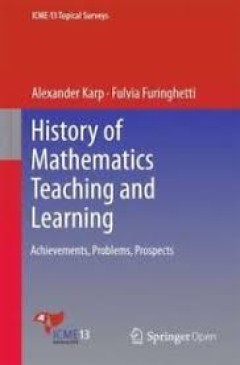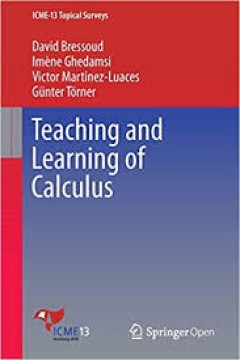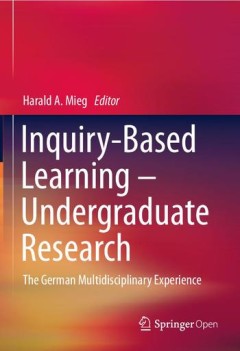Filter by

Developing and assessing academic and professional writing skills
- Edition
- -
- ISBN/ISSN
- 9783653049732
- Collation
- 205 p.; 24 cm.
- Series Title
- -
- Call Number
- 808.0071 DEV d
- Edition
- -
- ISBN/ISSN
- 9783653049732
- Collation
- 205 p.; 24 cm.
- Series Title
- -
- Call Number
- 808.0071 DEV d

History of mathematics teaching and learning
The history of mathematics education is afield of study that is both old and new. It is old because scholarly works in the field began to appear over 150 years ago. Schubring (2014a) refers to Fisch (1843), as possibly thefirst work on the subject published in Germany. In the United States thefirst dissertations on mathematics education (Jackson 1906; Stamper 1906) focused specifically on i…
- Edition
- -
- ISBN/ISSN
- 9783319316154
- Collation
- -
- Series Title
- -
- Call Number
- 510.71 KAR h

Teaching and learning of calculus
This “ICME-13 Topical Survey” aims to give a view of some of the main evolutions of the research in the field of learning and teaching Calculus, with a particular focus on established research topics associated to limit, derivative and integral. These evolutions are approached with regard to the main trends in the field of mathematics education such as cognitive development or task design…
- Edition
- -
- ISBN/ISSN
- 9783319329741
- Collation
- -
- Series Title
- -
- Call Number
- 515 BRE t

Women and migration: responses in art and history
- Edition
- -
- ISBN/ISSN
- 9781783745678
- Collation
- 670 p.; 24 cm.
- Series Title
- -
- Call Number
- -
- Edition
- -
- ISBN/ISSN
- 9781783745678
- Collation
- 670 p.; 24 cm.
- Series Title
- -
- Call Number
- -

Oral literature in Africa
- Edition
- -
- ISBN/ISSN
- 9781906924720
- Collation
- xliv + 570 p. ; 24 cm.
- Series Title
- -
- Call Number
- -
- Edition
- -
- ISBN/ISSN
- 9781906924720
- Collation
- xliv + 570 p. ; 24 cm.
- Series Title
- -
- Call Number
- -

Science as social existence: heidegger and the sociology of scientific knowledge
n this bold and original study, Jeff Kochan constructively combines the sociology of scientific knowledge (SSK) with Martin Heidegger’s early existential conception of science. Kochan shows convincingly that these apparently quite different approaches to science are, in fact, largely compatible, even mutually reinforcing. By combining Heidegger with SSK, Kochan argues, we can explicate, elab…
- Edition
- -
- ISBN/ISSN
- 978-1783744114
- Collation
- 444 p.
- Series Title
- -
- Call Number
- -

Inquiry-based learning -- undergraduate research : the German multidisciplina…
This open access book provides a systematic overview of experiences with Inquiry-Based Learning (IBL) and undergraduate research (UR) in German universities, covering both research universities (Universitäten) and universities of applied sciences (Fachhochschulen). Divided into three parts, the book starts with the principles and common practices of IBL/UR at all universities. Part Two discuss…
- Edition
- -
- ISBN/ISSN
- 9783030142230
- Collation
- xvi, 406p. : ill.
- Series Title
- -
- Call Number
- 378 INQ i

Universities, innovation and the economy
Universities are increasingly expected to be at the heart of networked structures contributing to society in meaningful and measurable ways through research, the teaching and development of experts, and knowledge innovation. While there is nothing new in universities’ links with industry, what is recent is their role as territorial actors. It is government policy in many countries that univer…
- Edition
- -
- ISBN/ISSN
- 9781134344185
- Collation
- xii, 265p. : ill.
- Series Title
- -
- Call Number
- 338.476200094 SMI u

Universities in transition : foregrounding social contexts of knowledge in th…
Universities are social universes in their own right. They are the site of multiple, complex and diverse social relations, identities, communities, knowledges and practices. At the heart of this book are people enrolling at university for the first time and entering into the broad variety of social relations and contexts entailed in their ‘coming to know’ at, of and through university. By r…
- Edition
- -
- ISBN/ISSN
- 9781922064837
- Collation
- xi, 244p. : ill.
- Series Title
- -
- Call Number
- 378.1980994 UNI u

Making publics, making places
This book focuses on the surprising generative possibilities which digital and smart technologies offer media consumers, citizens, institutions and governments in making publics and places, across topics as diverse as Twitter audiences, rural news, the elasticity of the public sphere, Weibo, cultural heritage and responsive spaces in smart cities. Multidisciplinary perspectives engage with crit…
- Edition
- -
- ISBN/ISSN
- 9781925261431
- Collation
- xviii, 216p. : ill.
- Series Title
- -
- Call Number
- 307.76 MAK m
 Computer Science, Information & General Works
Computer Science, Information & General Works  Philosophy & Psychology
Philosophy & Psychology  Religion
Religion  Social Sciences
Social Sciences  Language
Language  Pure Science
Pure Science  Applied Sciences
Applied Sciences  Art & Recreation
Art & Recreation  Literature
Literature  History & Geography
History & Geography